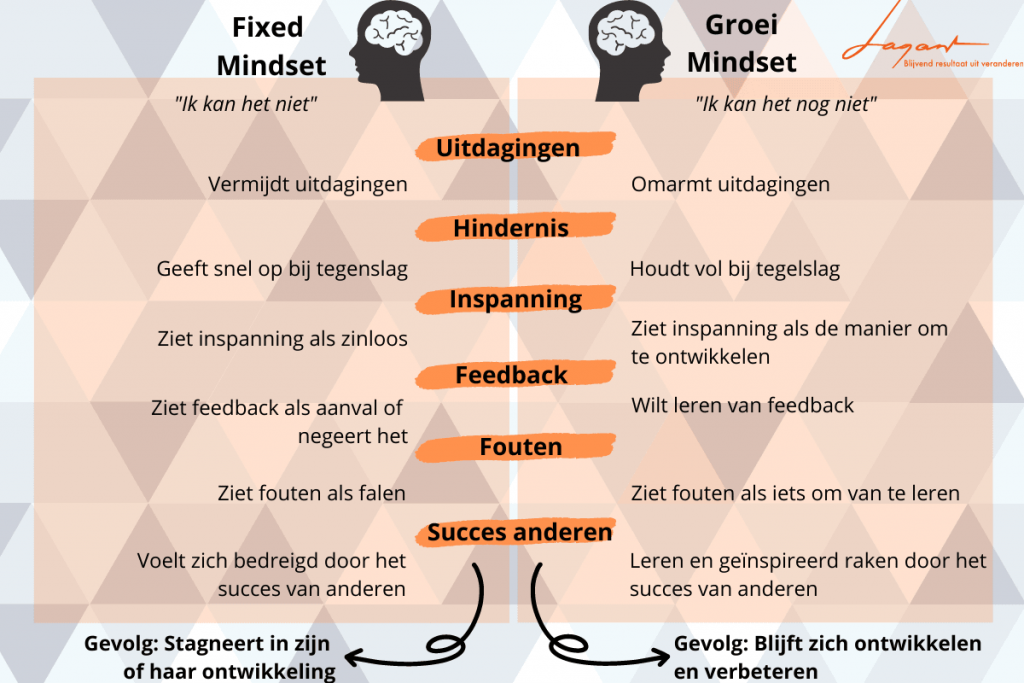There are 10 indicators that show that an organization or team has a agile mindset has. But what does that mean for the individual? When are team members, managers or other stakeholders able to adopt an agile mindset?
Maybe Carol Dweck has the answer to that. Recently I came into contact with the work of this professor of psychology. Dweck also uses the term "mindset" in her work. She does this to indicate how someone thinks about capacities and talents. She distinguishes two different mindsets:
• of fixed mindset with a fixed, fixed way of thinking; versus
• of growth mindset in someone with a growth mindset.
An example of someone with a typical growth mindset is Pipi Longstocking.
- Yes but Pippi, said Tommy, you can't play the piano, can you?
- How can I know if I've never tried it?, Pippi replied.
Individuals are somewhere in between the two mindsets in terms of their thinking. One is more fixed, the other more focused on growth, but it is important to realize that you have both ways of thinking at home. In Dweck's lecture, the mindset can be seen in individual behavior.

What strikes me are the strong similarities between the indicators of an agile mindset and Dweck's growth mindset for individuals. Is a growth mindset at an individual level perhaps a condition for cultivating an agile mindset within teams and organizations? Is there an excellent role for the agile coach here?
These questions are rhetorical as far as I am concerned. Of course, as agile coaches, we must invest in the personal coaching of team members (and of managers and other stakeholders), especially when we perceive a predominantly fixed mindset with them. Because with a fixed mindset among people, an agile mindset within the organization cannot reach maturity. That is why it is our job to guide people from a fixed to a growth mindset, in order to lay a foundation for the agile organization.
How you guide people in this change is part of our training NLP for Agile Coaches.
There are 10 indicators that show that an organization or team has a agile mindset has. But what does that mean for the individual? When are team members, managers or other stakeholders able to adopt an agile mindset?
Maybe Carol Dweck has the answer to that. Recently I came into contact with the work of this professor of psychology. Dweck also uses the term "mindset" in her work. She does this to indicate how someone thinks about capacities and talents. She distinguishes two different mindsets:
• of fixed mindset with a fixed, fixed way of thinking; versus
• of growth mindset in someone with a growth mindset.
An example of someone with a typical growth mindset is Pipi Longstocking.
- Yes but Pippi, said Tommy, you can't play the piano, can you?
- How can I know if I've never tried it?, Pippi replied.
Individuals are somewhere in between the two mindsets in terms of their thinking. One is more fixed, the other more focused on growth, but it is important to realize that you have both ways of thinking at home. In Dweck's lecture, the mindset can be seen in individual behavior.

What strikes me are the strong similarities between the indicators of an agile mindset and Dweck's growth mindset for individuals. Is a growth mindset at an individual level perhaps a condition for cultivating an agile mindset within teams and organizations? Is there an excellent role for the agile coach here?
These questions are rhetorical as far as I am concerned. Of course, as agile coaches, we must invest in the personal coaching of team members (and of managers and other stakeholders), especially when we perceive a predominantly fixed mindset with them. Because with a fixed mindset among people, an agile mindset within the organization cannot reach maturity. That is why it is our job to guide people from a fixed to a growth mindset, in order to lay a foundation for the agile organization.
How you guide people in this change is part of our training NLP for Agile Coaches.
It is our mission to help customers get their change ambitions to come true.
Our location in Amersfoort is located directly opposite the main entrance of the NS station and is therefore easily accessible by public transport.
If you come by car, it is best to park at the Q-Park P+R Barchman Wuytierslaan, approximately a 5-minute walk from our office.